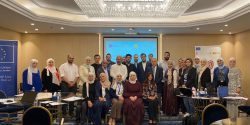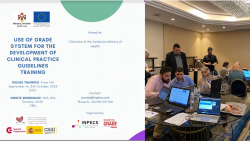CIESAL researcher involved in setting up and teaching training course in the Kingdom of Jordan
24/10/2023
Javier Bracchiglione, a leading researcher at CIESAL and faculty member at the Universidad de
Valparaíso School of Medicine, helped organise and teach a course entitled “Use of the GRADE
system for development of clinical practice guidelines.” The course was aimed at strengthening
the development of clinical guidelines in Jordan by training professionals from the Jordanian
Ministry of Health in the GRADE approach, which is currently the most used methodology in the
world for the development of clinical guidelines.
The course was organised by the CSAI Foundation, part of the Spanish Ministry of Health, as
part of a project run by the Spanish Agency for International Development Cooperation and
funded by the European Commission, together with the Reayah Project in Jordan, which is
aimed at the prevention and management of non-communicable diseases through primary
health care.
The course was made up of two parts. The initial phase consisted of 14 videos explaining the
key theoretical concepts behind the GRADE approach and was conducted online and at the
convenience of the participants. The second phase was a workshop that the team conducted in
Amman, Jordan, which focused on the application of the methodology in a more practical
manner.

Dr Bracchiglione was joined in the workshop by Dr Pablo Alonso-Coello and Dr David Rigau from
the Iberoamerican Cochrane Centre and the Barcelona GRADE Working Group, Dr Francisca
Verdugo Paiva from the Epistemonikos Foundation, and Dr Reem Mustafa from the University
of Kansas and the US GRADE Network and Evidence Foundation.
The workshop was delivered to 22 health professionals from the Ministry of Health, mainly
doctors, working in different areas such as paediatrics, oncology, family medicine and surgery,
among others. On day one, the participants learned how to prioritise problems from a public
health point of view, and the appropriate make-up for a panel developing clinical guidelines, as
well as how to find and assess clinical guidelines from other settings. The second day focussed
on assessing the certainty of the evidence, i.e., the interpretation of the findings of evidence
syntheses for subsequent use in clinical guidelines. The third day centred on implementing the
"From Evidence to Decision" approach outlined in the GRADE methodology. This approach aims
to create a framework for generating recommendations by explicitly considering not only the
evidence of intervention effectiveness, but also the values and preferences of patients, cost and
cost-effectiveness concerns, equity, acceptability and feasibility, among other factors.
We would like to congratulate Dr. Bracchiglione for his exceptional contribution to this teaching
initiative, which has strengthened the international connections of our university.



